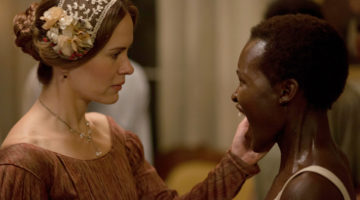Interview: Brit Marling and Ellen Page chat about 'The East'
There is a reason that The East, Zal Batmanglij’s taut, suspenseful thriller about a secret eco-activist organization, feels so authentic, and is filled with moral complexity. It’s because Batmanglij and his creative partner and star of the film, Brit Marling, have firsthand experience living like the characters.
In the film, a beautiful young agent (Marling) working for a private security firm goes undercover to infiltrate a secretive anarchistic collective. They hop trains to get around, scrounge for food in trash, and feed and bath one another. As Sarah becomes closer to the group, she starts to realize she may have more in common with them than she initially thought.
Marling herself, who wrote the screenplay along with Batmanglij, certainly has more in common with the collective than her character as the film starts.
“When we wrote it, we were at a point in our lives where we just didn’t know what we were doing,” says Marling during while promoting the film in Toronto alongside costar Ellen Page. “We were just broke and reading a lot about the anarchist freedom movement, and we were really interested in what other young people were doing and feeling.”
“So we just hit the road with backpacks and we didn’t have any money. We stayed on different organic farms, and different intentional communities, and we fell in with groups of anarchists in a bunch of different cities.”
Among the skills Marling acquired, and ones utilized by the group members in the film, include lock picking, train-hopping, sleeping on roof tops, and dumpster diving – while being vegan, mind you.
Ellen Page too had spent time living off the grid, as it were. “I had stayed on this eco-village development on an organic farm in Oregon and had experienced some of that fringe type of community,” she explains. “When you do something like [dumpster diving], you sort of begin to realize that it’s the status quo that’s unusual. The more you learn, the more you realize that what we do now is the really insane thing.”
“A lot of those ideas were being explored in what they had written, and with it being things I was already interested in, it was a compelling and exciting project for me to be a part of.”
In the film, the East are eco-terrorists of sorts, besetting wasteful, polluting corporation. In one jam (term for their activist attack), albeit a tamer one, they vandalize the house of an oil executive, filling his home with the same pollutant he dumps in the ocean.
“It was basically an exercise in realizing how much abundance their actually is in the waste of our culture,” says Marling of her time as a nomad, a theme the runs throughout the film and spurs the group.
Sarah is the outsider initially, pretending to be an activist with passion and dedication and purpose – one of ‘them.’ During her first evening, though, dinner proceeds in a peculiar manner and Sarah is very clearly the alien. Those in the group belong to something greater, while Sarah lacks a true identity, lying to them about who she really is just as she lies to her boyfriend about what she really does.
The audience too may be like ‘the other’ at times, especially as the group is unlikeable in the beginning, that is, before they became individual characters with personality and motive and ideals. While the East’s lifestyle may be familiar to Marling, it was understood that film audiences may not connect as easily. “[The East] allows them to at least let them go on my character Sarah’s journey, as she experiences something so different and so “other” than what she’s used to,” says Marling.
“She is labeling her own emotions as fear when in actuality it really is just discomfort with something that’s new and different. When you work through that, the ideas that you’ll find on the other side can be better, or at least point you in a different direction.”
Page agrees. “It can be such a paradigm shift when you are living on an organic farm in that community, because you are forced to digest things completely differently, and that can be really hard when you look at living so very differently.”
The film has a decided message, and does portray a fringe element of society, but it is, in the end, an entertaining thriller. It is what Marling wanted, entertaining yet thoughtful, accessible yet challenging, and all without compromise. “Isn’t the ultimate culture jam to make something that enters the world widely and carries some subversive ideas? “




